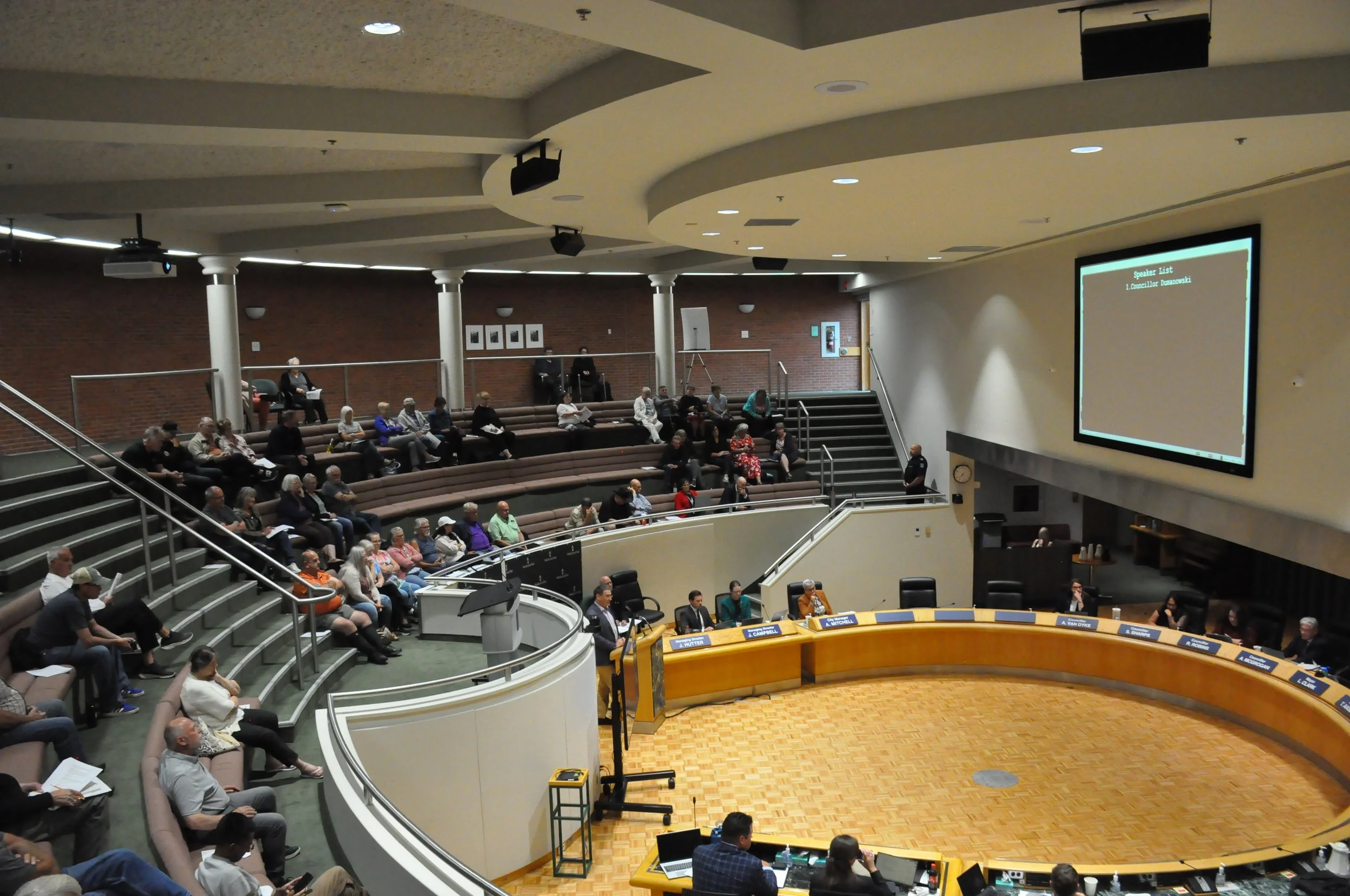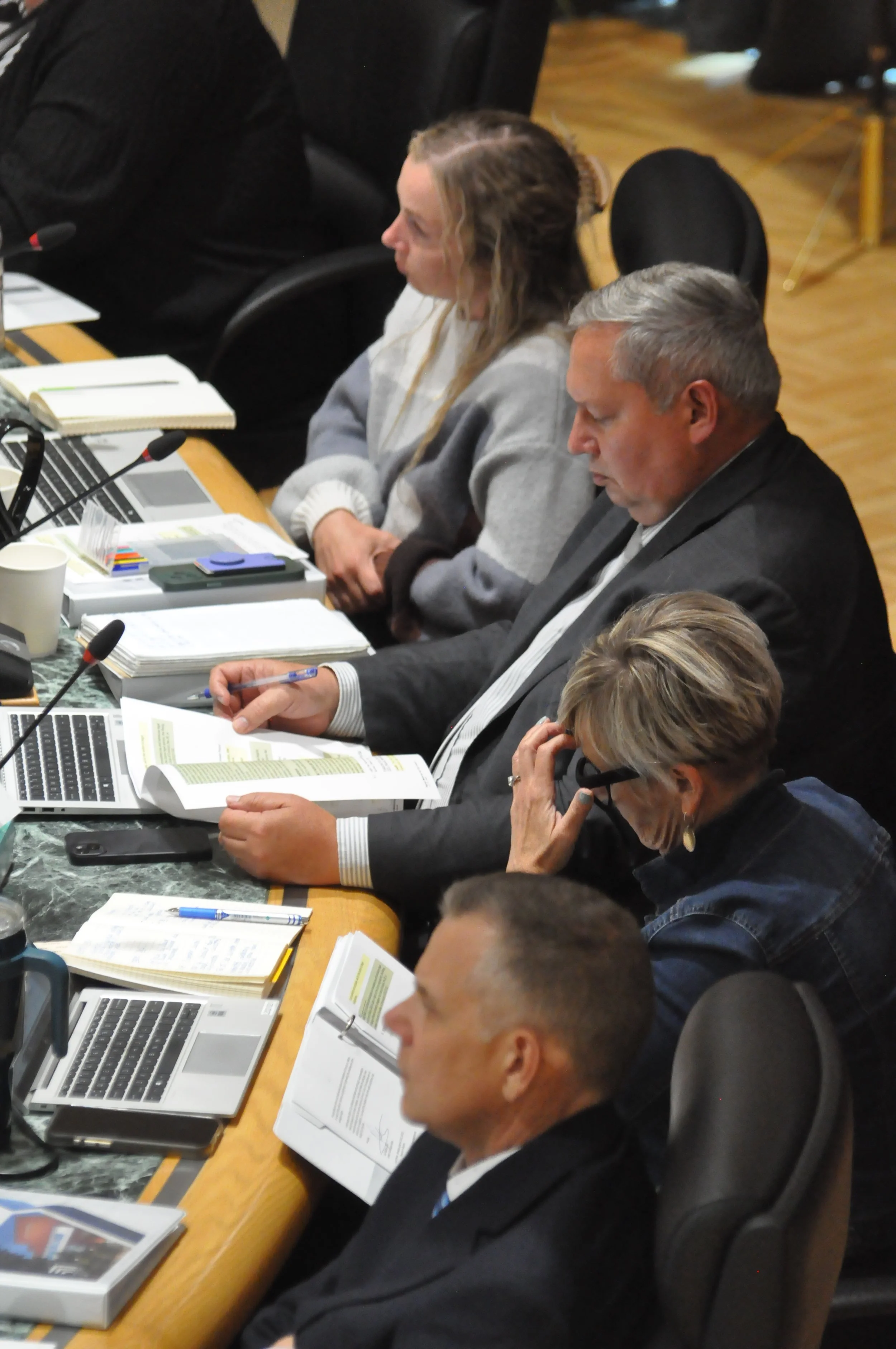Council Rejects MCC, Defers Rate Review Committee Decision
Approximately 60 members the public at city council chambers Monday evening. Clapping and cheers from the crowd were expressed during and following council defeating a motion to create a municipally controlled corporation.
After months of presentations, debate and handwringing, Medicine Hat city council is rejecting transferring its municipally owned and run utility into a corporate entity.
But the decision as to whether to establish a rate review committee to set utility rates has been put over to September.
The five to four split vote fell in favour of not proceeding with putting the city’s electrical generation as well as power and gas transmission assets into a municipally controlled corporation (MCC).
All councillors weighed into the debate, with most councillors highlighting future financial issues being faced by the city’s energy division to various degrees.
Coun. Darren Hirsch (centre) during Monday’s council meeting. (Photo Alex McCuaig)
“Status quo in not an option,” stated Coun. Darren Hirsch speaking in support of the MCC. “The world has changed. Doing the same holds no water anymore.”
Hirsch pressed the issue regarding not just the regulatory and financial challenges the energy division will be facing but those of future councils to just begin to understand the business at hand.
“The Alberta (energy market) is going through a redesign. It’s currently underway. There’s interrupters to market. We are now looking at the end – or the beginning of the end – of what we would consider fossil fuels, the management thereof,” he said. “We’re already getting calls from individuals saying, ‘what are you doing? You are driving this gas-powered power producer, in my world now, I want renewable.’”
He stated the city is facing a $1.1 billion bill to just maintain the city’s energy division’s goals without the considerations of the community’s needs.
“Part of the biggest thing for me to be able to come forward to say I’m not capable of making those day-to-day decisions is knowing the enormity that lies ahead,” said Hirsch.
But when it comes to the community needs, specifically regarding Hatters struggling to pay bills a time of high challenges meeting basic costs of living, Coun. Ramona Robins said that is the reason she’s not supporting the move to an MCC.
“The hurdles we need to clear are not set yet,” said Robins regarding the changing regulatory framework, adding she appreciated the comprehensive package of information provided to council and the public.
But she also noted the municipality has been managing the city’s utilities since 1902 and have been, “successful when you look at how successful Medicine Hat is and they still represented the needs of their citizens at the same time as trying to make a profit for those same citizens.”
The cost of living is the biggest impact facing Hatters, said Robins regarding what she has heard most from community members.
“It’s having a serious effect on their ability to flourish, people are frustrated, people are afraid for their future,” she said. “What I haven’t heard is any suggestion the MCC will mean lower costs for our ratepayers – the same people who are struggling to pay their bills.”
Speaking in support of the MCC, Coun. Robert Dumanowski stated he is, and always has been, a supporter of the municipally owning its own utilities.
Coun. Ramona Robins during Monday’s council meeting. (Photo Alex McCuaig)
But pushing the decision off, “is a dereliction of duty,” while appropriate safeguards are in place to change direction.
“There are appropriate and ongoing exit ramps available for future councils, if they wish, to remove themselves from this MCC,” he said.
In her reasoning against the MCC, Mayor Linnsie Clark said irrespective of the changing regulatory framework and costs or benefits associated with them, the utility division will be required to deal with them regardless of who is running day-to-day operations.
“The notion about the amount of money that’s going to have to be put into our energy business – that is the case no matter which route we go,” she said. “Luckily, there is an example of how we can do skills-based governance of our energy division without the cost complexity, disruption, asset transfer of a municipally controlled corporation. And that is the rate review committee.”
Clark and Robins were joined by councillors Shila Sharps, Allison Knodel, Alison Van Dyke in defeating the MCC motion. However, moves to try to pass the bylaw to establish a rate review committee (RRC) were complicated by the interconnection of the design of that body with the bylaw to establish the MCC, councillors heard.
Council heard that staff will need until at least September to present a standalone RRC bylaw.




